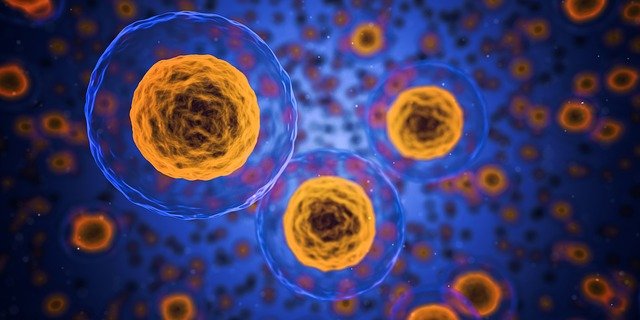Cell Regeneration and Hormones: What Is the Connection?
Image by Arek Socha from Pixabay
Human bodies consist of millions of tiny cells. They are only visible under a microscope. Moreover, many cells make up tissues that eventually form body organs.
- As you mature into an adult, most cells typically become specialized in performing specific functions in the body. They hence stop reproducing often. However, blood and skin cells continue dividing and multiplying as long as you live.
- HGH secretion naturally occurs in the body. Essentially, it is beneficial in stimulating the production of new cells in the body. The pituitary gland found at the base of the brain produces a particular hormone called human growth hormone.
- Naturally, the body keeps making new cells to replace the dead or damaged ones. Alternatively, the process of the body continuously making new cells is called cell division. Through cell division, one cell doubles into two. Additionally, two cells multiply into four cells, and this goes on throughout the process.
- Research shows that the cells in humans can reproduce to a maximum range of 50 to 60 times. Cell division is ultimately successful when new cells and old cells are similar. During cell division, all cells must make copies of their genes. The cell then splits into two. After this, the cells continue dividing and producing new cells till the cells are enough.
- Notably, cancer occurs when the genes in the old cells are not the same as the genes produced in new cells. After this, the cells continue dividing.
Cell Regeneration Process
- Alternatively, the cells in the body tissues keep dividing and growing until the body is fully developed. Cell regeneration is the process of reconstructing, restoration, and rebuilding missing or damaged cells. Most living organisms are capable of cell regeneration.
- Regeneration can be either complete or incomplete. Complete regeneration occurs when the restored new tissue is similar to the damaged or lost tissue. Incomplete regeneration entails the thickening of tissues, which is called fibrosis.
- Regeneration occurs because of molecular processes called gene regulation. Cell proliferation, cell differentiation, and morphogenesis are some of the gene regulation processes. They are involved in the elementary level cell regeneration.
- Remarkably, there are animals like hydra, which have extensive regenerative abilities. Two types of regeneration occur when hydra is cut into two. Due to the uniqueness of hydra regeneration, scientists have progressed in their research in regeneration biology.
Which Hormones Are Involved in the Process and Why?
- Endocrine signals directly regulate how the body responds to injuries. Endocrine signals are responsible for allocation of resources such as energy and inhibiting or promoting cell proliferation. Additionally, they enhance the differentiation of pathways that are beneficial to the cell regeneration process.
- Researchers in the field of endocrine signals classify hormones as catabolic or anabolic. Their conclusion is based on the effect that each process causes. For anabolism to occur, energy is required. Moreover, the process is called the endergonic process. There are four vital anabolic hormones used for growth. They include insulin-like growth factor -1, human growth factor hormone, testosterone, and insulin. Notably, a deficiency in these hormones leads to a slow regeneration process.
- Anabolic and catabolic hormones need to balance for cell regeneration to happen. An imbalance is likely to cause pain in the wound. Imbalances occur when there is a decrease in the activities generated by anabolic hormones. Additionally, it can also happen when there is an increase in the actions caused by catabolic hormones.
- The somatotrophs cells found in the pituitary anterior are involved in HGH secretion. Growth hormone consists of proteins containing around 190 amino acids. It contributes to physiologic processes like metabolism and growth, and the physiological effects of growth hormones can be either direct or indirect.
- IGF-1 majorly causes indirect effects. The production of insulin-like growth factors is a response to activities caused by growth hormones. Various tissues and the liver secrete it. IGF-1 is essential for muscle growth and the growth of bones.
- Alternatively, IGF-1 stimulates cell proliferation and cell differentiation, which boosts regeneration and cell growth.
- HGH is essential for cell regeneration and healing since it stimulates the production of a gene critical. Its production tends to decrease, as you grow older. The body becomes less and less capable of repairing its tissues as it ages. Interestingly, in humans, the liver is the only organ with the ability to regenerate completely.
- It also stimulates cell proliferation. It is a process where a cell develops then divides into two daughter cells. Essentially, this process is beneficial for the regeneration of cells leading to tissue growth. Cell proliferation requires the growth and division of cells to coincide.
- HGH therapy for HGHD is conducted on adults The treatment for HGHD is a scientifically proven process to stimulate growth. This treatment is only given to people who suffer from hormone deficiency and not bodybuilders. Anyway, even most commonly prescribed brands’ instructions should be accurately studied, before the usage. Such details as Norditropin dosage, warnings, indications and contraindications are essential for your safety and results of treatment.
- Notably, HGH treatment is not administered to children who suffer from growth hormone deficiency. It is essential to get a qualified physician’s prescription before taking part in this therapy. Additionally, a doctor should test your blood before you take part in this therapy.
- Norditropin dosage is given to adults who suffer from Noonan syndrome. It is given to people who suffer from a slow growth rate.
Ways to Improve Cell Regeneration Process
- By focusing on stimulating growth in stem cells, you can boost the cell regeneration process. Remarkably, stems are capable of growing into different sizes. Proper nutrition can fundamentally stimulate cell regeneration. To promote cell proliferation, ensure you take foods rich in protein.
- Moreover, your lifestyle choices impact massively on cell regeneration. Ensure you get enough sleep. Exercising also boosts muscle regeneration.

